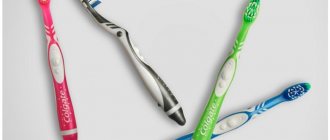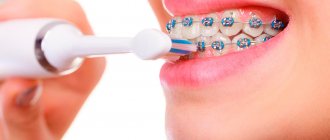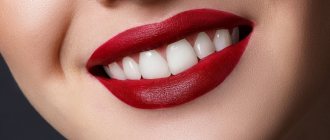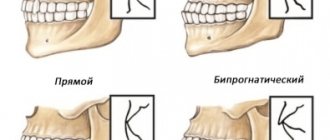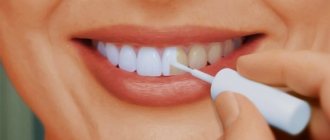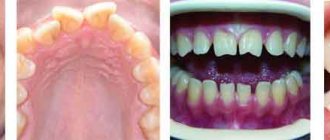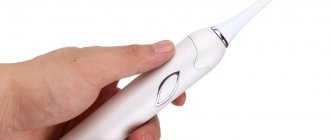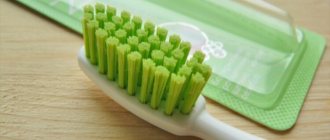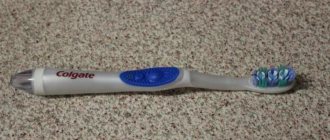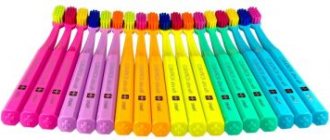The quality of oral care determines the health of teeth, their protection from the influence of cariogenic microbes, the absence of an unpleasant odor, as well as the whiteness and beauty of a smile. To keep your mouth clean, you need a reliable companion – a toothbrush. The characteristics it has determine how atraumatically and efficiently the enamel will be cleaned. What takes better care of your teeth: a soft toothbrush or a hard one? How to choose the right dental assistant? Let's take a closer look at these issues.
Toothbrush hardness levels
Brushes for cleaning teeth are divided into several groups based on the stiffness of the bristles. This marking is always indicated on the packaging. Selecting a brush with the required degree of elasticity of the bristles ensures good dental care and does not damage the enamel.
Depending on the hardness, the following types of brushes are distinguished::
- Very soft toothbrushes - used for children, they are also used by people suffering from periodontal disease. It is important to remember that such a hygiene product should only be used on medical advice.
- Toothbrushes with soft bristles are indicated for bleeding gums, diabetes, and for pregnant women who develop gingivitis. This device must be used using a special technique that eliminates unnecessary pressure on the gums and teeth.
- Toothbrushes with medium-hard bristles are classic brushes that are suitable for all people who do not have serious oral pathologies.
- Hard brushes are recommended for people who have strong enamel but suffer from increased plaque formation, as well as fans of cigarettes and coffee. A product with such bristles is good at removing pigmentation on teeth, but you should not use it regularly.
- Brushes with very stiff bristles are special devices used for cleaning braces, fixed bridges and removable dentures.
Which brush is better to brush your teeth: hard or soft?
The choice depends on several factors:
- Age. It should be borne in mind that soft bristles are used primarily for children and older people with dental problems. At the same time, middle-aged people most often use devices with medium or hard bristles;
- The condition of the gums plays a vital role in determining the type of hygiene item. For healthy people, medium hardness is suitable, which will create an additional massage, but if you have any problems, you need a softer product;
- Wearing dental structures forces their owner to use hard brushes, since the damage they can cause is significantly less than the benefit in this case;
- Condition of tooth enamel. With particularly thin enamel, teeth become sensitive and the use of harsh hygiene products will only aggravate the problem. In this case, with a sufficient layer, problems will not arise, and the whiteness of the teeth will become more obvious.
Thus, before purchasing oral hygiene products, analyze your own condition, or better yet, consult a dentist for advice. This way you can spend your money wisely and for the benefit of your teeth.
Features of the location of the bristles
More than half a century ago, people used toothbrushes made from both natural bristles and synthetic fibers. Now scientists have proven that it is permissible to use only products with artificial bristles, because a natural brush absorbs moisture, and this provokes the growth of microorganisms.
The end part of the villi is always rounded so as not to scratch the surface of the enamel and soft tissues of the oral cavity. Nylon bristles are grouped in tufts, which are arranged in various ways along the surface of the plastic head. According to the height of the pile, brushes come with a single-level arrangement of elements, two-, three-, and also multi-level.
The beams are fixed to the site in a special way, and can be installed both parallel to each other and at different angles. The difference in location allows for more complete cleansing of all tooth surfaces.
What does hardness depend on?
Modern brushes are made from synthetic materials. They have a number of advantages compared to natural bristles:
- Does not absorb moisture and dries quickly;
- Prevents the growth of bacteria;
- The fibers do not break;
- Change color at the end of the possible use period.
Hardness directly depends on the thickness of the synthetic fibers and their quantity.
As a rule, the villi are collected in bundles of 30 pieces, after which they are evenly seated in the body at the same distance from each other. Standard brushes usually produce 4-5 rows of tufts.
At the same time, in some products the bundles may be:
- Various hardness;
- Various lengths;
- Located at different angles.
All this allows you to further enhance the cleaning effect, as it helps the villi penetrate into hard-to-reach areas.
Types of soft toothbrushes
The dental market offers a wide variety of oral care products.
Let's look at the most famous types of toothbrushes:
- A classic manual brush is a standard device for hygiene procedures. The variety of types is due to varying degrees of rigidity, arrangement of beams, and sizes of the working head.
- Ionic toothbrush - allows you to more effectively clean your teeth from plaque. Its peculiarity lies in the rod on which titanium dioxide is applied. When it comes into contact with saliva, anions are released, which are attracted to hydrogen cations. In this case, food particles are attracted to the bristles and the acidic waste products of microflora are neutralized.
- An electric toothbrush is a popular device for oral hygiene. It has some advantages over a standard brush. Firstly, the small size of the head allows you to clean difficult to reach areas. Secondly, pulsating movements help soften deposits on the teeth. Thirdly, a combination of rotational, translational and vibrating movements cleans the surface more effectively.
- An ultrasonic brush is a new product among oral cavity products. It not only cleans your teeth, but also takes care of soft tissues and prevents gum inflammation.
Are there any contraindications?
There is no list of contraindications for using a soft toothbrush, however, this does not mean that such a device cannot harm your teeth. The main disadvantage of soft bristles is that the degree of cleaning of the enamel is not good enough compared to normal or hard bristles.
Don't use a soft toothbrush:
- with a tendency to increased stone formation and accumulation of dental plaque;
- people who smoke;
- persons with a completely healthy oral cavity;
- with crowded teeth.
The use of soft bristles products for hygiene in such people is undesirable due to inadequate cleaning of the tooth surface and the likelihood of leaving plaque behind.
Recommendations when choosing
There is a wide variety of brushes, so to choose the right product for yourself, consult your dentist.
Simple rules will also help you make your choice:
- choose a brush with artificial bristles, it will last longer and will not contribute to the growth of bacteria on the bristles,
- the standard length of the head is 2.5-3 cm - this is the optimal size for an adult,
- pay attention to the end of the bristles - it should be smoothly rounded so as not to cause injury,
- If the dentist has not prescribed a specific type of brush, then buy a product of medium hardness, because too hard bristles can scratch the enamel, and soft bristles will not remove soft deposits well.
Who should use soft toothbrushes?
Toothbrushes with soft bristles are not for everyone, because if there are no indications for their use, cleaning with such a product will not be effective enough.
Very soft toothbrushes should be purchased for young children who are just beginning to learn oral care skills. It is also convenient to use such products during the period of change from a milk bite to a permanent one, so as not to injure the softened and inflamed mucous membrane of the gums.
Adults also use very soft and gentle toothbrushes. The main contingent is people suffering from marginal periodontal diseases. Gingivitis, periodontitis, periodontal disease, mobility of teeth of the third and fourth degree - all these are indications for the use of this type of hygiene products.
A soft toothbrush is ideal for people diagnosed with non-carious lesions such as erosion and wedge-shaped defect. The brush gently treats the enamel surface without causing additional wear on tooth tissues that are subject to abrasion.
Review of the most popular models
The assortment of every manufacturer producing oral hygiene products includes models with soft tufts.
Let's consider the most popular:
- SPLAT Professional Sensitive - the villi are split into four parts, each of which is rounded to avoid injury. The bristles are impregnated with silver ions, which protect against bacterial attack on the teeth.
- LACALUT Sensitive - equipped with soft bristles that protect tooth enamel from damage and gently cleanse the oral cavity.
- Colgate 360 Sensitive Pro-Reliev - in addition to the fine bristles, there is a tongue brush on the back of the head. Among the tufts there are rubber cups that allow you to polish the tooth surface.
- Jordan Target Sensitive - has a small working part, which makes it possible to penetrate well into the back of the mouth. Ultrasoft bristles have a diameter of 0.01 mm.
How to make a toothbrush soft?
If the new brush turns out to be not comfortable enough to use, then having the knowledge of how to make a toothbrush soft, you can eliminate the excessive hardness of the bristles. To do this, take the product by the handle and place it under running very hot water. Under the influence of high temperature, the villi will begin to soften and become more pliable. It's also worth trying to knead the stubble with clean fingers. In this case, it is necessary to act carefully so as not to change the direction of the tufts and not to break the brush fibers.
The choice of a toothbrush must be taken seriously - the likelihood of developing carious lesions depends on it, so when making a purchase, focus not on the price or appearance of the product, but on the description of the product, the shape of the head, the general appearance of the bristles and its level of hardness. An incorrectly chosen toothbrush can damage the integrity of the enamel and injure the mucous membrane, which can lead to the formation of stomatitis.
Author: Violeta Kudryavtseva, dentist, especially for Karies.pro
Varieties
Stay up to date! According to their purpose, toothbrushes are divided into:
- classic. Recommended for daily hygiene. These include products indexed medium and hard;
- therapeutic and preventive. Used for specific areas of the oral cavity. A good choice would be products with combined bristles;
- highly specialized. They are used to care for dentures and various orthodontic structures (braces). For these purposes, products marked extra hard are used.
For your information! According to the type of action, devices are divided into:
- classic mechanical. When used correctly, they quickly and effectively remove food debris and other contaminants. Their advantages include: affordable cost, simplicity and ease of use;
- electric with a moving head. They operate from a small built-in motor and are often equipped with a timer. Their positive aspects include saving free time and effort when brushing your teeth. They effectively soften and remove plaque thanks to their reciprocating and rotating movements. In most models, you can independently adjust the speed of rotation of the head;
- sound. They appeared on the market relatively recently and work using sound waves. In such models, the bristles rotate at a speed of 24 thousand revolutions per minute and penetrate even the most inaccessible places;
- ultrasonic. Their operating principle is very different from other models. Using a sound wave, they destroy plaque, eliminate gum inflammation, and neutralize pathogens. They are able to penetrate into the deepest and most distant places of the tooth surface. Their advantages include gentle cleansing of the oral cavity and elimination of unpleasant odor. But such a brush can be used no more than 2-3 times a week. It is contraindicated for people suffering from epilepsy and heart disease.
